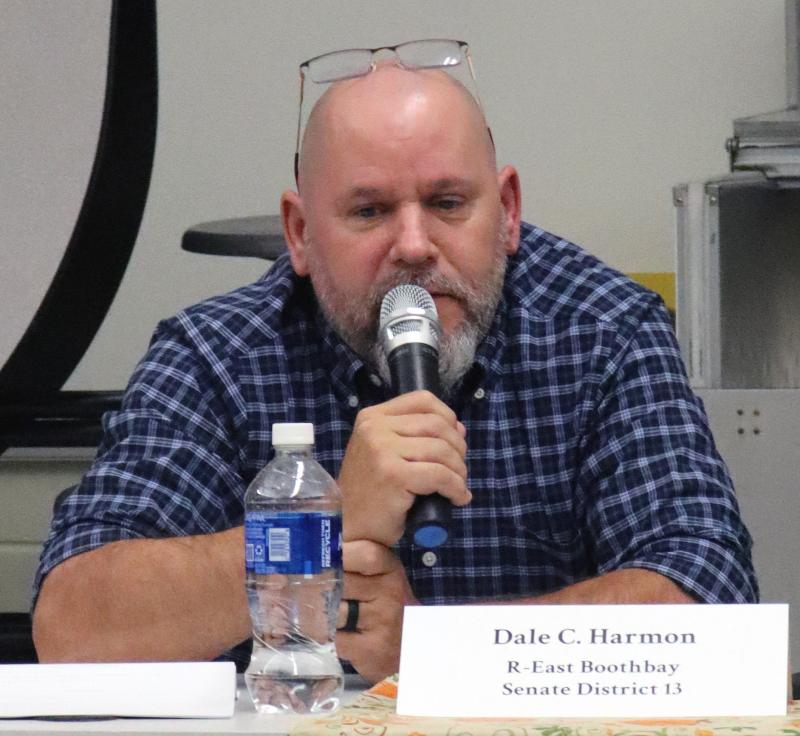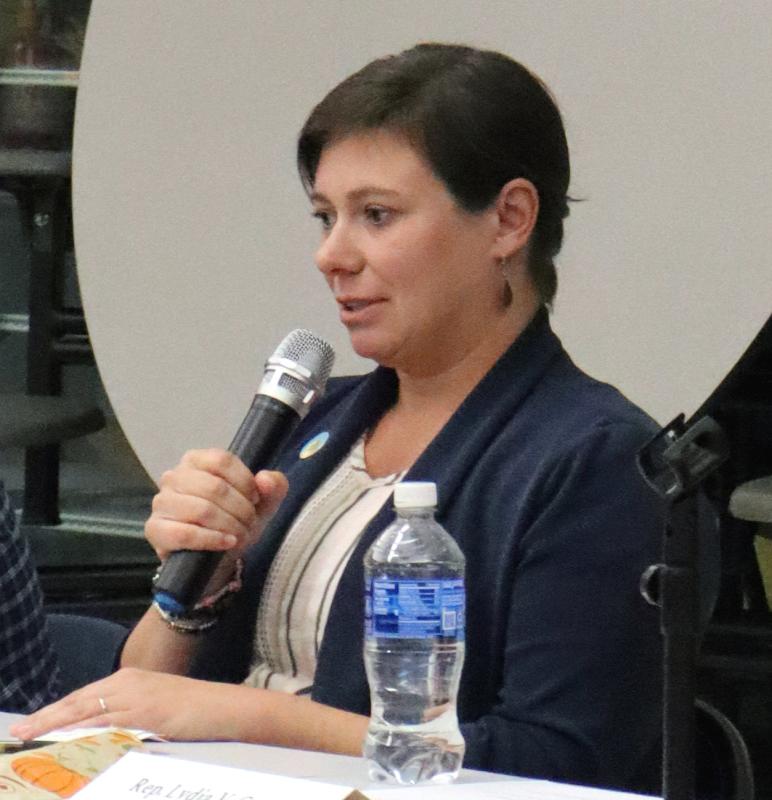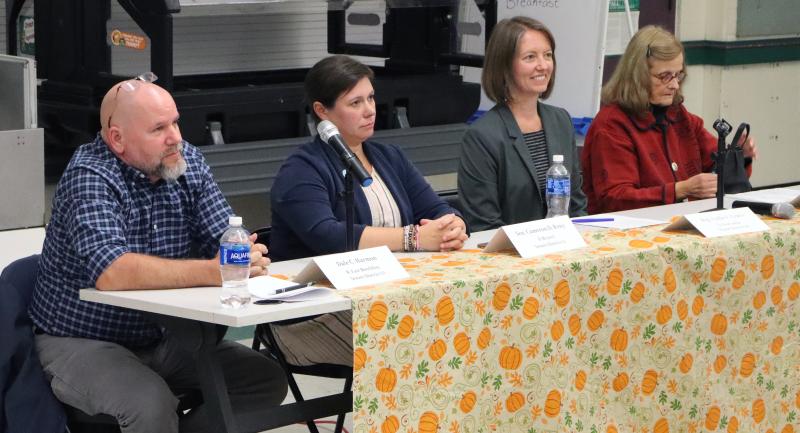Candidates tackle rising costs, affordable housing at final forum
 Dale Harmon, R-East Boothbay, introduces himself to roughly 60 audience members at a forum in Damariscotta the evening of Thursday, Oct. 10. Harmon said he is running for Senate District 13 because he “wants to be part of the solution.” Piper Pavelich photo
Dale Harmon, R-East Boothbay, introduces himself to roughly 60 audience members at a forum in Damariscotta the evening of Thursday, Oct. 10. Harmon said he is running for Senate District 13 because he “wants to be part of the solution.” Piper Pavelich photo
 Sen. Cameron Reny, D-Bristol, addresses concerns constituents have brought to her during a forum at Great Salt Bay Community School in Damariscotta the evening of Thursday, Oct. 10. Reny said concerns include rising property taxes and the cost of living. Piper Pavelich photo
Sen. Cameron Reny, D-Bristol, addresses concerns constituents have brought to her during a forum at Great Salt Bay Community School in Damariscotta the evening of Thursday, Oct. 10. Reny said concerns include rising property taxes and the cost of living. Piper Pavelich photo
 From left: Senate District 13 candidates Dale Harmon, R-East Boothbay, and Sen. Cameron Reny, D-Bristol, and House District 46 candidates Rep. Lydia Crafts, D-Newcastle, and Mary Lou Daxland, R-Newcastle, listen to a question during a candidates forum at Great Salt Bay Community School in Damariscotta the evening of Thursday, Oct. 10. Piper Pavelich photo
From left: Senate District 13 candidates Dale Harmon, R-East Boothbay, and Sen. Cameron Reny, D-Bristol, and House District 46 candidates Rep. Lydia Crafts, D-Newcastle, and Mary Lou Daxland, R-Newcastle, listen to a question during a candidates forum at Great Salt Bay Community School in Damariscotta the evening of Thursday, Oct. 10. Piper Pavelich photo
 Dale Harmon, R-East Boothbay, introduces himself to roughly 60 audience members at a forum in Damariscotta the evening of Thursday, Oct. 10. Harmon said he is running for Senate District 13 because he “wants to be part of the solution.” Piper Pavelich photo
Dale Harmon, R-East Boothbay, introduces himself to roughly 60 audience members at a forum in Damariscotta the evening of Thursday, Oct. 10. Harmon said he is running for Senate District 13 because he “wants to be part of the solution.” Piper Pavelich photo
 Sen. Cameron Reny, D-Bristol, addresses concerns constituents have brought to her during a forum at Great Salt Bay Community School in Damariscotta the evening of Thursday, Oct. 10. Reny said concerns include rising property taxes and the cost of living. Piper Pavelich photo
Sen. Cameron Reny, D-Bristol, addresses concerns constituents have brought to her during a forum at Great Salt Bay Community School in Damariscotta the evening of Thursday, Oct. 10. Reny said concerns include rising property taxes and the cost of living. Piper Pavelich photo
 From left: Senate District 13 candidates Dale Harmon, R-East Boothbay, and Sen. Cameron Reny, D-Bristol, and House District 46 candidates Rep. Lydia Crafts, D-Newcastle, and Mary Lou Daxland, R-Newcastle, listen to a question during a candidates forum at Great Salt Bay Community School in Damariscotta the evening of Thursday, Oct. 10. Piper Pavelich photo
From left: Senate District 13 candidates Dale Harmon, R-East Boothbay, and Sen. Cameron Reny, D-Bristol, and House District 46 candidates Rep. Lydia Crafts, D-Newcastle, and Mary Lou Daxland, R-Newcastle, listen to a question during a candidates forum at Great Salt Bay Community School in Damariscotta the evening of Thursday, Oct. 10. Piper Pavelich photo
Nearly 60 audience members listened as four candidates for state office discussed topics ranging from health care concerns to suggested improvements to education in the final forum co-hosted by The Lincoln County News and the Boothbay Register on Thursday, Oct. 10.
The forum, which was held in the cafeteria of Great Salt Bay Community School in Damariscotta, featured candidates from Senate District 13 and House District 46.
Sen. Cameron Reny, D-Bristol, and Dale Harmon, R-East Boothbay, are the candidates for Senate District 13, which represents all of Lincoln County except Dresden, as well as Washington and Windsor. Reny is seeking reelection for a second term.
Rep. Lydia Crafts, D-Newcastle, and Mary Lou Daxland, R-Newcastle, are the candidates for House District 46, which consists of Bristol, Damariscotta, Monhegan, Newcastle, and Nobleboro. Crafts is seeking reelection for a third term.
Following their introductions to the audience, each candidate shared concerns constituents have brought to them throughout their campaigns, which included rising costs, affordable housing, education, and health care.
Harmon and Daxland noted that rising energy costs are playing a role in the increased cost of living that Mainers are experiencing, and that lowering energy costs is a primary task to address if they are elected.
Daxland said wind and solar power are not providing the amount of electricity Mainers need at a fair price, and that the Legislature should consider hydropower.
Reny said she would like to see Maine be “as energy independent as possible,” and that discounting renewable energy sources is not the way to do that.
“We need to be diversifying, we need as many options for energy as we can get so we can use the cheapest - and wind is the cheapest - and supplement what we need to supplement while still moving away from greenhouse gasses,” she said.
In regard to increased property taxes, Daxland said she believes repealing L.D. 290, “An Act to Stabilize Property Taxes for Individuals 65 Years of Age or Older Who Own a Homestead for at Least 10 Years,” was a mistake and has added to the burden Mainers are feeling. The bill was enacted in August 2022, but was repealed by the Legislature in July 2023.
“Our seniors are suffering … I believe that we have to take care of our seniors first, because we have so many in this county,” she said.
Crafts said while L.D. 290 was “a great idea,” one concern amongst legislators was that it did not have an income requirement.
“When legislators are given the task and the responsibility of spending taxpayer dollars, it means a lot to decide how you put those dollars out into our communities, and I don’t know how people feel about this, but high income earners, I don’t believe, should be the target of property tax relief,” she said.
The establishment of Maine’s State Property Tax Deferral Program addressed the lack of an income requirement in L.D. 290, according to Crafts. The program, which was established in January 2022, is a loan program that covers the annual property tax bills of eligible Mainers who are ages 65 and older or are permanently disabled and who cannot afford to pay them on their own.
While it can be costly, continuing to fund programs that will help vulnerable community members is crucial, Crafts aid.
“A million and a half dollars to help people stay in their homes because we know it's far more costly to try to house someone who's lost their home than to try to keep them where they are, so I think that there will continue to be challenges but we have programs in place that need to be funded and continued,” she said.
An important piece of the housing crisis in Maine is keeping people in their current homes, Reny said.
“It’s not only the right thing to do, it is the fiscally responsible thing to do … It is proven to be much cheaper and better to help those families out before they end up homeless, maybe with a rental payment, and keep them in their homes,” said Reny.
According to Harmon, affordable housing “doesn’t exist” in Maine right now.
“When a one-bedroom apartment costs you $1,600 with nothing included, we’re going the wrong way. Something is broken at the state level … We need to do things to fix that,” he said.
One way to address the housing shortage in the state is to improve upon the current education system, specifically by offering more vocational training opportunities to students, said Harmon.
“I think we need to stop pushing everybody to college and get people into trades. I think if you have a whole pile of people out there building houses, the cost of houses comes down,” he said.
Harmon said he believes the state should be committed to expanding upon educational programs such as boatbuilding, welding, and apprenticeships for builders and plumbers.
Daxland said the state needs to focus on subjects such as reading, writing, social studies, and civics, as emphasis on basic academics will help improve testing scores across the state.
She also noted that students need to be provided with a broader education about local, state, and federal government.
“Most students that get out of high school today have no clue how the government runs,” Daxland said. “When you have a good government course, you are being taught the constitution. You have to read it, you have to compare it with the Articles of Confederation, there’s a lot of things you have to learn by reading the constitution, and that’s why we have to make sure that our students know, when they graduate, that we are a constitutional republic, and we are not a democracy.”
As a social worker, Crafts said she has vast experience in special education and that she is “extremely proud” of the work that occurs in Maine schools.
Crafts noted something that could be improved upon in the education system is Maine’s Essential Programs and Services funding formula, which identifies the types and amounts of resources needed in all schools and calculates the cost, according to legislature.maine.gov.
“Funding is a terrific challenge,” she said. “The way we fund education is inherently unequal, it’s based on our property valuations, and that means that across our state, you have a huge discrepancy in education.”
Crafts said one of the best things the state could do is invest in support staff and teachers.
“We’ve seen paraprofessionals, ed techs, be underpaid for years and years, and those are the folks providing intervention, providing the direct instruction in special education, helping and providing the intervention that students need to make up the gains they’ve lost from the COVID shutdown,” Crafts said.
Reny said Maine schools are “very dedicated” to providing basic academics to students, but that interventionists, education technicians, and general support from communities and the state are needed.
“Please be involved in your local schools … Because that is how we are going to make progress for our kids,” she said.
Harmon said one way he would like to see the Legislature address the lack of health care in rural areas is through the development of mobile health care centers.
“I know they’ve done it in other states, I can’t imagine we couldn’t do it here,” he said. “We’re rural, we have to think out of the box … There’s a lot of us down here on the coast and in the southern part, but there’s a whole heck of a lot of us up north too that don’t have quite the access that we do.”
Reny noted that as well as a lack of health care providers, the cost of prescription drugs is an issue Mainers are facing.
To address this, Reny sponsored L.D. 1829, “An Act to Reduce Prescription Drug Costs by Requiring Reference-based Pricing.” The bill was passed to be enacted in the House in April, but the Senate placed the bill on the Special Appropriations Table, a special process for deferring action on bills that could affect general fund appropriations or revenue, according to maine.gov.
“I came so close and I want to see it through,” she said. “Prescription drugs are one of those things that you have to have.”
The state of emergency services in Maine was also discussed by candidates, including a proposed emergency response rule from the Occupational Safety and Health Administration. According to Lincoln County fire department officials, the proposed regulations would increase financial burdens on emergency services by requiring the implementation of additional safety measures, which could possibly result in reduced manpower and limited resources.
Harmon said that at the state level, he hopes Maine will fight back “tooth and nail” on the proposed rule.
“I don’t even know how some small systems are going to be able to survive at all,” he said.
Reny said the proposed regulations “would put us out of commission.”
“One of the standards … Equipment has to be less than 10 years old, and there’s a lot of our fire departments where we can’t even buy the fire truck until it’s over 10 or 15 years old, because that’s when we can afford it,” she said. “We need to make sure that if we’re having regulations and safety protocols, they need to be reasonable and manageable.”
In an effort to promote volunteerism, Crafts said a project she is excited about is using American Rescue Plan Act funds at the county level to pilot housing developments on municipal land specifically for emergency services personnel.
“What we find is, when we have volunteer departments and folks are strapped just to pay their basic costs, making time for volunteering gets progressively more difficult,” she said.
Crafts said a project like this is a great way to “invest locally” and utilize land that municipalities already have.
Candidates said that, on the national level, political divide is apparent. However, both Reny and Crafts noted that at the state level, everyone works together to solve problems, citing their own experiences.
Reny said she believes it is the responsibility of legislators and candidates for office to do what they can to “lower the temperature.”
“We need to do our best to help keep people on the level and focus on the issues that really matter to us, here, in Lincoln County,” she said.
Crafts said state politics in Maine is different from national politics partly because Maine legislators are not “career politicians.”
“Most of us have other jobs or other things we return home to,” she said. “We may disagree on how we reach the goals, but most of us have very similar goals for what we want to see the state of Maine look like.”
The Lincoln County News and the Boothbay Register co-hosted five forums, which are available to watch on The Lincoln County News Facebook page.
The first forum, held in Wiscasset on Sept. 26, featured candidates from House District 47, which consists of Alna, Jefferson, Whitefield, and Wiscasset; House District 49, which includes Arrowsic, Georgetown, Phippsburg, West Bath, and Woolwich; and House District 53, which consists of Chelsea, Dresden, Pittston, and Randolph.
The second forum, held in Dresden on Sept. 30, featured candidates from Senate District 24, which represents Dresden and all of Sagadahoc County, and House District 53.
The third forum, held in Boothbay on Oct. 3, featured candidates from Senate District 13 and House District 48, which consists of Boothbay, Boothbay Harbor, Edgecomb, South Bristol, Southport, and Westport Island.
The fourth forum, held in Waldoboro on Oct. 7, featured candidates from House District 45, which includes Bremen, Louds Island, and Waldoboro in Lincoln County, as well as Washington and Friendship; and House District 62, which consists of Hibberts Gore and Somerville in Lincoln County, as well as China, Palermo, and Windsor.
The general election is Tuesday, Nov. 5.
This article appears through a content-sharing agreement with the Lincoln County News.


























